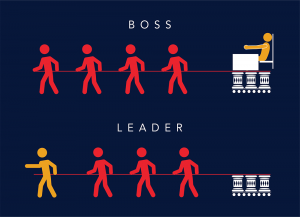Have you ever wondered why people want to work for companies like Google or Inditex while many employees are quitting from other companies? The problem is that 45% of people leave a company because of a bad boss. What differentiates a leader from a boss?
Think of a time when you were happy and productive working in a team.
It may be in the workplace—a professional department, a scientific team, a hospital or military unit; it can be a sports club such as a group of runners; maybe it’s an educational, political, or volunteer project, or even a family trip that you have fond memories of.
Who made the decisions? How were agreements reached? How did you manage \ different opinions? Why would you want to work with them again? What was the secret to your high performance? Who played the leadership role?
These are the questions I have studied for 30 years, applying the science of psychology to the leadership of individuals and teams in organizations.
In this article, you will discover the 5 main differences between bosses and leaders. If you keep reading, you will find out how much you act as a leader and how much your boss acts as a leader.
But before getting there, let’s start with a definition of leadership.
What is Leadership?
The formal definition of leadership includes three elements: the leader, the subordinates or followers, and the context.
Leadership emerges at the intersection of these three elements. Figure 1 graphically represents this idea, known as the interactional model of leadership.

Leadership does not exist in a vacuum, but in a context that is rapidly changing. The old saying, “The only constant is change,” is truer than ever.
My definition? Leadership is the ability to mobilize the hearts and minds of other people to achieve common goals. Goals that transcend personal interests (one’s own interest) to seek social welfare (keeping at heart the interest of the whole group or society).
This definition encompasses the three fundamental aspects of leadership:
- The leader. As a leader, you influence others to coordinate collective efforts. The essence of leadership is influence. Leaders, like you, are the glue of society; you serve as a coordinator for collective action.
- Group memberswho share your vision as a leader. Thus, the vision of the leader must fit with the values of the group. The leader represents and embodies these values.
- The context. Leaders do their work in a changing social and cultural We live in turbulent business times—Volatile, Uncertain, Complex, and Ambiguous (known as a VUCA context).
With this definition in mind, let´s see the differences between a boss and a leader.
“Leaders have much more to do with artists and scientists than with managers.” – Abraham Zaleznik
I quote Zaleznik because he was the first to suggest this distinction, back in 1977. He observed a big difference between leading and managing that lies in their interpretation of order and chaos.
Here are 5 differentiating characteristics between a leader and a boss.
5 Characteristics That Distinguish a Leader vs. a Boss
1 – Bases of Power
Where does power come from?
There are two main sources of power:
- positional– based on your position in the hierarchy and chain of command.
- personal– based on your own characteristics, such as knowledge, earned trust, vitality, and connections.
This can be further divided into the 5 French & Raven sources of power:
- Positional: reward and coercive power
- Personal: expertise, referent, and connectional power
When you act as a boss, you rely on your position—your reward and coercive power. You use your ability to provide rewards like increasing your subordinate’s salary, offering a promotion, or assigning development assignments or a bigger office. You can also use coercive power—threatening and intimidating with firing, for example.
A hierarchical and authoritarian boss focuses attention on micromanaging the process of when and how to do the work. This creates a negative work environment where rules and bureaucracy prevail and it demotivates employees.
Think about it! Your company can assign you the position of boss, but not leader. You become a leader only when you earn the trust and respect of your team (personal power).
Leadership has nothing to do with titles and everything to do with character.
A true leader uses personal power—expert, referent, and connectional.
Expert power: If you want to become a leader, earn the respect of your team with your knowledge and expertise.
Referent power: Build trust with your character through leading by example and inspiring your team with a purpose when you communicate the why.
Connectional power: Create collaborative relationships that promote collective growth.
 Figure 2 graphically represents the positional power of the boss versus the personal power of the leader with their teams.
Figure 2 graphically represents the positional power of the boss versus the personal power of the leader with their teams.
2 – Influence Tactics
Leadership means influence.
But there are two different, big ways to influence your team: hard and soft influence. Which one you’re working with depends on how much your team internalizes your vision.
Hard influence is normative. They do it because they feel obliged.
Soft influence is internal. They do it because they believe in it.
If you act like a boss, you influence others based on your authority using hard tactics like punishment, intimidation, threats.
Using rewards to influence, like promising a promotion, is more effective but still your vision is not internalized. Your team will do what you say because of external benefits. In this case, the internal value of the task is lost.
In contrast, when you act as a leader, you influence others with participation and engagement. You show passion, appeal to their inner values. As a result, they feel part of your vision. You create a work environment where they feel comfortable sharing and expressing their opinions.

3 – Orientation to Change: Adaptation vs. Innovation
The boss accepts reality as it comes and therefore focuses on problems with a rational and analytical attitude seeking adaptation. When you act as a boss, your priority is adaptation over change. You like rules, regulations, etc.
On the contrary, the leader scrutinizes reality to anticipate change with innovation. When you act as a leader, you prefer innovation and the search for opportunities.
The boss’s brain directs its attention towards details. You are more likely to see the trees than the forest. You focus on compliance with rules and objectives. Your brain does not tolerate ambiguity well.
Meanwhile, the leader’s brain focuses attention on the big picture, searching for patterns of reality. Your intuitive brain as a leader is more likely to see the forest than the trees. You see future opportunities for growth, innovation, and improvement.
Your brain works differently when you act as a boss than when you act as a leader.
4 – Attitudes Towards Goals: Short Term vs. Long Term
A boss looks for operational goals in the present and in the short term, without considering the repercussions in the medium or long term. Therefore, a boss might go after goals that can be counterproductive in the future and not at all sustainable.
If you want to be a true leader, your attitude towards goals must be long-term oriented. This implies accepting a certain degree of chaos that is inherent in situations of change. You must leave your comfort zone and accept that situations get worse before they get better.
Your tolerance for ambiguity is necessary to be able to innovate and take advantage of future opportunities.
5 – Relations with Others
Managers seek micro-control over subordinates through imposing or giving orders and instructions. This does not mean that they do not get involved in activities with their teams. In fact, they feel comfortable participating in activities with their teams. This is a form of control.
But what is interesting is that they try to keep a low level of emotional involvement with subordinates. When you act as a boss, you prefer relationships based on formal roles and keep long-distance power.
On the opposite side, leaders relate to others through empathy—you can put yourself in the other person´s shoes and feel for them. You view each subordinate as a unique individual and care about their personal and professional growth. Therefore, they perform better, individually and collectively.
If you want to be a leader, you must know how to “read” people from this emotional point of view. And for this, you must enhance your skills in emotional intelligence.
So . . . How Can You Be a Leader? What Does It Take to Be a Leader?
In Table 1, you can find an infographic summary of these 5 differences.

Unfortunately, the predominant style in our organizational ecosystem is hierarchical and pyramidal—we find more bosses than leaders.
Let´s be clear. A certain degree of managerial orientation is necessary to maintain the stability of the organization. I do not deny that. However, being a boss with a transactional management style as the default is not effective and can even be counterproductive for managing people and teams in these current times of change.
It is not an easy task. You have probably noticed that many managers (bosses) are threatened by the true leaders in the organization because the true leaders promote changes that can make bosses lose control and power.
If you want to develop your authentic leadership, here I anticipate the 3 skills that you need to develop. I will talk about them in a future article.
- Leaders create emotional Passion and enthusiasm motivate people and inspire them to achieve goals.
- Leaders challenge the status quo with new ideas. This cognitively oriented learning style stimulates imagination, creativity, and innovation.
- Leaders build relationships with othersto achieve great projects that transcend their own self-interests and benefit all.
In the following post, I will give you examples of world-renowned leaders (and others who are not) and I will answer the question you are surely asking yourself: Is a leader born or made?
Now I run to the gym. But tell me about your experience with your bosses. Do you consider any of them a leader? Tell me why.
Thank you, and I’ll see you in the comments.

